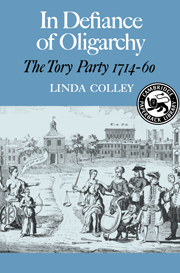Book contents
- Frontmatter
- Contents
- For my parents and Toby
- Preface
- Part I The Problem of Tory Survival
- Part II The Ingredients of Tory Survival
- 3 The Tory Party in Parliament
- 4 The Content of Toryism
- 5 The Tory Party in the Constituencies
- 6 The Fabric of the Tory Appeal
- Part III Single-Party Government Assailed
- Conclusion
- Appendix
- Manuscript Sources
- Notes
- Index
6 - The Fabric of the Tory Appeal
Published online by Cambridge University Press: 03 February 2010
- Frontmatter
- Contents
- For my parents and Toby
- Preface
- Part I The Problem of Tory Survival
- Part II The Ingredients of Tory Survival
- 3 The Tory Party in Parliament
- 4 The Content of Toryism
- 5 The Tory Party in the Constituencies
- 6 The Fabric of the Tory Appeal
- Part III Single-Party Government Assailed
- Conclusion
- Appendix
- Manuscript Sources
- Notes
- Index
Summary
The extent of extra-parliamentary toryism was an eighteenth-century commonplace. ‘Two thirds of the nation were Tories’, William Pulteney told the King in 1742; two-thirds of the gentry and nine-tenths of the clergy, argued George Lyttelton in 1747. The pamphleteers located tory support lower down the social scale. Those tempted to vote tory, warned a ministerialist in 1734, should ponder on the likely beneficiaries of a tory administration: ‘I think I need not say, how agreeable it will be to Judgements and Inclinations of…: the Mob of England.’ ‘Tradesmen, Shopkeepers, Tories and Jacobites’ were the party's proclaimed allies in the 1749 Westminster by-election: ‘True, they have got the Mob on their side’, the government candidate was made to admit, ‘but have not we the Army?’ The historians - then as subsequently - tended to remark on the tory party's popularity while failing to explain it. ‘Their leaders were men of property and extraordinary abilities’, ventured John Almon in 1762; ‘Possessed of these advantages, it was impossible their speeches and remonstrances should fail of making a sensible impression on the minds of the people; and by taking the popular side of every question, though hardly ever successfully, they initiated themselves intirely into their favour.’ This is as unsatisfactory as basing estimates of popular toryism on the opposition bias of the provincial press and the open constituencies. It seems likely that the majority of people in early Hanoverian Britain were ‘agin the government’: the majority of people often are.
- Type
- Chapter
- Information
- In Defiance of OligarchyThe Tory Party 1714-60, pp. 146 - 174Publisher: Cambridge University PressPrint publication year: 1982



